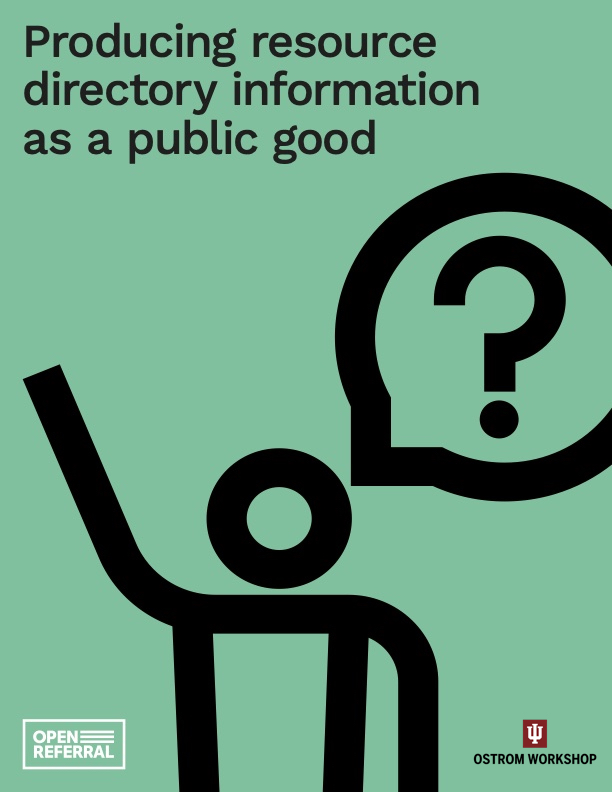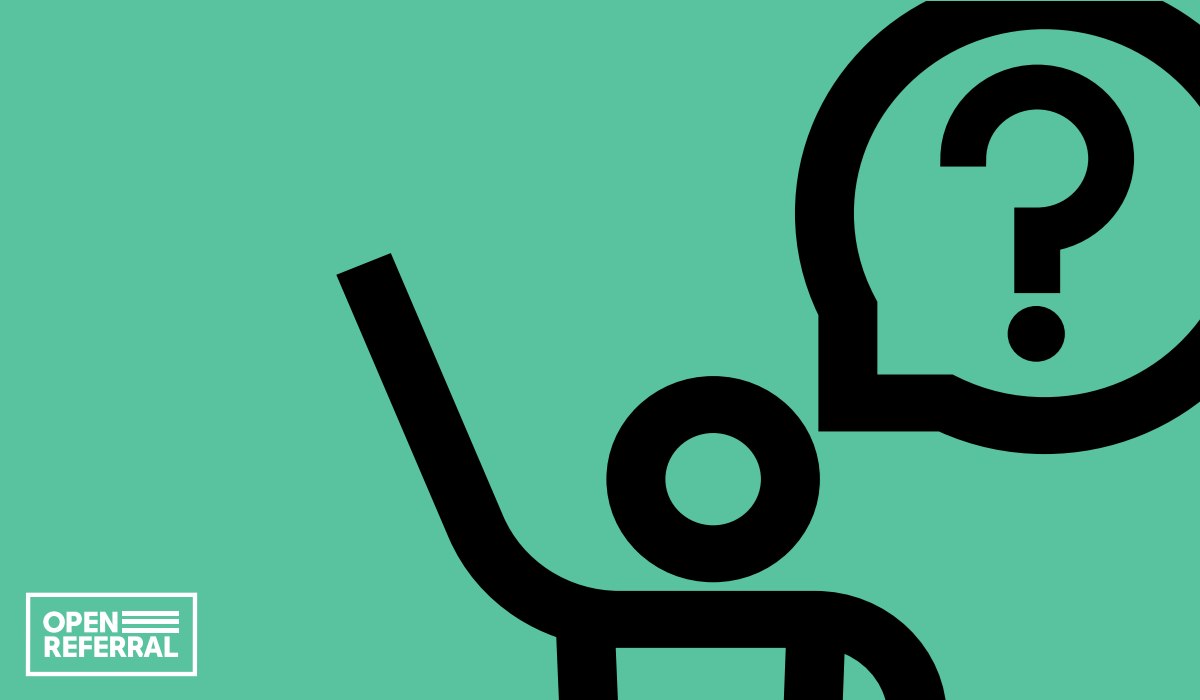Open Referral’s mission is to establish resource directory information as a public good – reliably and sustainably made freely available to all. Toward this end, we developed the Human Service Data Specifications – which enable the same resource data to be shared among many information systems – but we also know that solving this problem requires more than just technical interoperability. Indeed, success entails a transformation of the business models through which resource directory data is produced.
That’s why I’ve partnered with the Ostrom Workshop at Indiana University to learn from the wealth of knowledge about institutional design and resource management that has been gathered there in the “Bloomington School” through which Elinor Ostrom produced her seminal work, Governing the Commons. At the Ostrom Workshop, I’ve gathered helpful language, logic, and pattern recognition that enable us diagnose challenges and articulate institutional design strategies with which communities can sustain costly production of resource directory data as a shared resource.
With essential guidance from these experts in commons governance, I wrote “Averting Tragedy of the Resource Directory Anti-Commons,” an essay published in the Cambridge Handbook on Commons Research Innovations (2021), in which I analyzed the resource directory data dilemma, and offered a set of institutional concepts with which communities can sustainably produce resource data as a public good. (I’ll briefly summarize this framework below.)
After this essay was published, the Ostrom Workshop provided us with some modest funding to develop a visual vocabulary with which we’ve graphically portrayed this set of set archetypal strategies. I’m excited to share with you the fruits of the first phase of this partnership: this whitepaper, with accompanying infographics (and haiku!) to describe several complementary models for resource data production strategies.

In brief: the Resource Directory Anti-Commons
In “Averting Tragedy of the Resource Directory Anti-Commons,” I unpack the critical analysis that has guided Open Referral’s work – and which I will quickly summarize here:
At root of the resource directory problem is a lack not of technology but rather incentives. Human services providers typically aren’t paid by the people they serve, and furthermore typically aren’t funded on a per-person basis (at least, not enough to cover the costs of service). Which means they don’t have strong incentives to attract more consumers by promoting information about their services out in the world. As a result, to have reliable resource directory information, someone has to make a lot of phone calls over and over again—ideally, with training and support, local knowledge, etc.—which is costly. The intermediaries who invest resources in producing this data, then, tend to consider it their property. No single intermediary can collect all of the data and meet the needs of everyone who wants to use it, so new parties are constantly launching new efforts to produce directories. And so we end up with more and more sources of less and less sustainable or trustworthy information.
This pattern can be understood as an “anti-commons”, in which many competing claims of ownership of the same resource (in this case, public information about human services) results in the resource being ineffectively provisioned. Supply increases yet demand remains un-met.
This tragic outcome is not inevitable! Other communities have solved problems like this before. We just need to apply a different logic than that which has created the anti-commons.
Institutional models for producing resource directory data as a public good
Rather than ask, for instance, how can we design THE BEST directory website that will beat all other websites in the directory website market, we ought to ask how can we design a better market? That’s what I offered in the second half of the Cambridge Handbook paper, and what we now depict visually (and, it bears repeating, in haiku!) in this new strategic whitepaper.
Here’s a very quick summary of what you might call our institutional design framework:
Registers are official lists. An “open data register” is a canonical source of machine-readable data about a given set of things. A “service register” is an official dataset of all services within a specific boundary, presumably established by an institution that has some authority over the services within that boundary (such as a funder, which can establish a register of all services that it funds; or an accrediting agency, which can establish a register of all services that receive accreditation). To be a register, a given list needs to be considered trustworthy – which means it needs to be routinely monitored and verified for accuracy. (For more reference on the register concept, see the Open Data Institute’s work on Registers.)
Utilities provide universal service of critical public value. A “data utility” provides data services to all in a given domain. A “resource data utility” would be a designated provider of resource-data-as-a-service within a given domain – presumably open data, accessible by all, as a “common carrier” service. Utilities are typically regulated by government (and/or industry consortia) to ensure that they serve the public interest as a “natural monopoly.” Sometimes they are subsidized by the government, though utilities may also sustain their operations by charging fees for premium levels of services and value-adding features. (For more on utilities, see the recently published casebook entitled Networks, Platforms, and Utilities. Also, see Civitas’ recent report on “Health Data Utilities,” which applies the utility concept to the domain of health information exchange.)
Collaboratives are networks of organizations that work together to produce and share reliable data. A “resource data collaborative” is comprised of some group of organizations that work together to produce higher quality resource data at lower collective costs. (For more reference on data collaboratives, see the GovLab’s research and thought leadership.)
Note that these three models are not mutually exclusive – in fact they are probably best applied in complementary configurations! A resource data utility can deploy and maintain service registers (perhaps as a revenue-generating service for governments and funders); a resource data collaborative could including registers in its network, and likewise might be anchored by a resource data utility.
(Also note that I don’t assume these are the only possible institutional solutions to this problem; indeed, I’d love to discover other tools that we can have in our proverbial box! We’ve looked far and wide for successful precedents of solutions to this problem in the information-and-referral domain, and this kind of problem in other domains, and these are the three patterns that have clearly emerged so far.)
Lastly, but not least: we also assume that there won’t be a one-size-fits-all solution to this problem, because different communities have different institutional landscapes and different needs. So we need to use these concepts as tools with which communities can design their own appropriate solutions.
And that’s why I’m so excited to announce what’s coming next…
Putting Theory into Practice: Help Us Build A Participatory Design Toolkit in 2024
Our partnership with the Ostrom Workshop is advancing to a new chapter: with funding from the Midwest Big Data Innovation Hub (MBDH) through the MBDH Community Development and Engagement (CDE) Program, we will evolve the concepts into a tool kit that helps communities collaborate in the process of designing their own resource directory information supply chain strategy.
This tool kit will offer a glossary, templates, and do-it-yourself design tools with which groups of stakeholders in a geographic community and/or in a specific domain of human services can work together to develop equitable and sustainable arrangements for the production of resource data as a public good.
As part of our plans, in 2024 we will partner with at least two communities to organize participatory workshops in which we put this tool kit to use in dialogue with resource directory maintainers and their partners in the community. Together, we’ll use this visual vocabulary to articulate hypothetical scenarios for sustainable cooperation among organizations that may have different tactical objectives but all share a common goal (improving the health and well-being of their communities) for which they need the same information.
Given that our support for this phase of the project comes from the Midwest Big Data Hub, we’re going to prioritize the development of future workshops with communities in the Midwest—if you’re in a Midwestern state, we especially want to hear from you! That said, we’d be glad to hear from anyone who is interested in organizing a workshop to apply these concepts to your community. Would you like to engage in similar efforts to develop community-driven strategy for upgrading the resource information supply chain in your community? Please reach out to learn more about how we can put these ideas to work in supporting your community’s collective action planning processes.
Many thanks to the Ostrom Workshop for their support (especially Dr Angie Raymond, who made this partnership possible). Thanks also to Ian Dutnall for his design expertise; the Open Data Institute, GovLab, and Civitas for their thought leadership; Aspiration for their fiscal sponsorship and mentorship of Open Referral; and a range of reviewers – including Clive Jones, Ariadne Brazo, Katya Abazajian, Christine Prefontaine, Linsday Ferris, and Lauren Reskin – who provided critical feedback as we developed this framework.


Leave a Reply